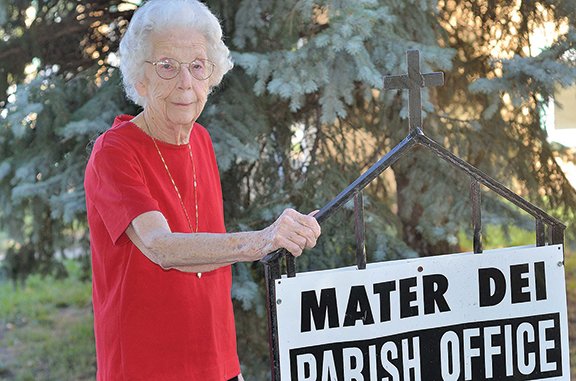
Leaven photo by Jill Ragar Esfeld
Irene Hinman stands outside the Mater Dei Parish office, where she stuffs the weekly bulletin and helps with the church bazaar and garage sale. Hinman also delivers Meals on Wheels and visits nursing homes, to the point where her daughters can’t just drop in because she’s never home.9
Mater Dei parishioner Irene Hinman learned to help at an early age
By Jill Ragar Esfeld
jill@theleaven.org
Topeka — Last Thursday, like every Thursday at Mater Dei Parish here, parishioner Irene Hinman was stuffing bulletins and bantering with receptionist Debbie Meyer — this time about her age.
When Meyer cautiously guessed Hinman’s age at early 80s, maybe 84, the older woman responded with a laugh.
Meyer was off by 10 years; Hinman is 94.
“She seems very young to me; she’s so full of spunk,” said Meyer. “I’m half her age and sometimes I just feel like — God, if she can do it, I can do it, too.”
But Hinman doesn’t think she’s doing anything out of the ordinary.
“I’ve done a little bit of everything, not much of anything,” she said.
She avoids further query by adding, “I always figured if you did a good deed, you kept it in a box; you didn’t tell.”
But her family and friends aren’t shy about the “little bit of everything” Hinman does.
“You don’t just drop by her house,” said her daughter Mary LeGrefley, a parishioner of St. John the Evangelist, Lawrence. “You call her to make sure she’s home, because she’s gone doing something every day.”
At 94, Hinman still helps deliver Meals on Wheels, visits nursing homes and volunteers with the election board. In addition to stuffing bulletins for Mater Dei, she helps with the church bazaar, garage sale and Sunday morning coffee.
“And she’s with a group called the Holy Name Rollers,” said her daughter Carolin Moore, a St. Mary, Newton, parishioner. “They roll silverware for funeral dinners.
“She was recognized by Mater Dei this summer with a really nice plaque for her volunteer work.”
For the last 25 years, Hinman has also been an important part of Let’s Help Topeka, an organization that provides clothing and meals to the poor.
“I’ve always sorted [donated] clothes at Let’s Help,” she said. “Nobody else wanted to do that.”
Hinman credits her mother with setting an example of helping others.
When she was very young, she said, “hobos” often came to their door looking for handouts.
“They called them hobos,” she explained, “but they were really men that were looking for work and they would go from town to town and ride the boxcars.”
Hinman’s mother always fed them.
“I remember sometimes, she would give them what we were going to have for supper,” she recalled. “And she would remind us that these were people that were looking for work, they were hungry and maybe they hadn’t eaten in a day or so.
“So we always understood if we didn’t have much for supper that night.”
Hinman lost her mother when she was 11. A few years later, her father was hit by a car and left an invalid.
So before she was out of high school, Hinman found herself working to support her father and younger sister by charging 50 cents for three hours of baby-sitting or housework.
Once she graduated and entered the workforce, she discovered a natural skill with numbers that enabled her to progress quickly from being a dime-store clerk at $8 a week, to a bookkeeper for $13 a week.
“I was always lucky,” she said. “Even during the Depression, I always found a job.”
Hinman met her husband Nelson at work, and together they shared the responsibility of caring for her father until he died in 1945.
And then, Hinman said, “I really prayed hard that God would send us some children.”
Her prayers were answered with her two daughters and a son, Nelson Jr.
For the next 40 years, the couple owned and managed a four-story apartment building in Assumption Parish in Topeka.
“We had 19 sleeping rooms and 13 apartments,” said Hinman. “I did bookkeeping and helped Nelson when I could. And the kids grew up painting.”
While caring for the building, the Hinman family also cared for the people inside, doing everything from helping elderly residents with shopping to preparing meals for those who were ill.
“With an apartment house,” said Hinman, “you’ve got lots of people you can help.”
But tragedy struck again, when Hinman’s husband developed Alzheimer’s disease.
“He was young when he got it — very young,” she said. “We had the apartment house, and my children were little.
“He wasn’t bedridden, but I really had to watch him because he would wander off. So I took care of him till he passed away in 1986.”
When asked if those were difficult years, Hinman doesn’t hesitate.
“I never thought of it as being a burden of any kind,” she said. “I look back now and sometimes I wonder how I did it.
“But, you know, you just take what God gives you every day.”
After her husband died, Hinman sold the apartment building and moved to a house. But she found it impossible to relax and retire.
And so she began volunteering — every day, in every way she could — for the next 25 years.
“I guess my calling is as a caregiver,” she said. “There are always more and more people to help, and it always makes me feel good.”
“Besides, it’s a reason to get dressed and get going every day,” she added. “And as long as I have good health, I want to do it.”
Part of Hinman’s charm is her unflagging optimism — clearly evident in her assessment of her own life, which, by anyone’s definition, hasn’t been easy.
“Oh, listen,” she said, “I’d like to live my life over again if it would be half as good as the one before.”






